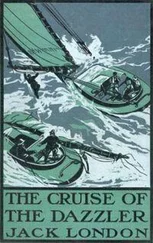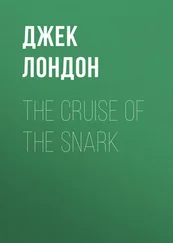Jack London - The Cruise of the Snark
Здесь есть возможность читать онлайн «Jack London - The Cruise of the Snark» весь текст электронной книги совершенно бесплатно (целиком полную версию без сокращений). В некоторых случаях можно слушать аудио, скачать через торрент в формате fb2 и присутствует краткое содержание. Жанр: Классическая проза, Морские приключения, на английском языке. Описание произведения, (предисловие) а так же отзывы посетителей доступны на портале библиотеки ЛибКат.
- Название:The Cruise of the Snark
- Автор:
- Жанр:
- Год:неизвестен
- ISBN:нет данных
- Рейтинг книги:3 / 5. Голосов: 1
-
Избранное:Добавить в избранное
- Отзывы:
-
Ваша оценка:
- 60
- 1
- 2
- 3
- 4
- 5
The Cruise of the Snark: краткое содержание, описание и аннотация
Предлагаем к чтению аннотацию, описание, краткое содержание или предисловие (зависит от того, что написал сам автор книги «The Cruise of the Snark»). Если вы не нашли необходимую информацию о книге — напишите в комментариях, мы постараемся отыскать её.
The Cruise of the Snark — читать онлайн бесплатно полную книгу (весь текст) целиком
Ниже представлен текст книги, разбитый по страницам. Система сохранения места последней прочитанной страницы, позволяет с удобством читать онлайн бесплатно книгу «The Cruise of the Snark», без необходимости каждый раз заново искать на чём Вы остановились. Поставьте закладку, и сможете в любой момент перейти на страницу, на которой закончили чтение.
Интервал:
Закладка:
A limited vocabulary means that each word shall be overworked. Thus, fella, in beche de mer, means all that piecee does and quite a bit more, and is used continually in every possible connection. Another overworked word is belong. Nothing stands alone. Everything is related. The thing desired is indicated by its relationship with other things. A primitive vocabulary means primitive expression, thus, the continuance of rain is expressed as rain he stop. SUN HE COME UP cannot possibly be misunderstood, while the phrase-structure itself can be used without mental exertion in ten thousand different ways, as, for instance, a native who desires to tell you that there are fish in the water and who says FISH HE STOP. It was while trading on Ysabel island that I learned the excellence of this usage. I wanted two or three pairs of the large clam-shells (measuring three feet across), but I did not want the meat inside. Also, I wanted the meat of some of the smaller clams to make a chowder. My instruction to the natives finally ripened into the following "You fella bring me fella big fella clam—kai-kai he no stop, he walk about. You fella bring me fella small fella clam—kai-kai he stop."
Kai-kai is the Polynesian for food, meat, eating, and to eat: but it would be hard to say whether it was introduced into Melanesia by the sandalwood traders or by the Polynesian westward drift. Walk about is a quaint phrase. Thus, if one orders a Solomon sailor to put a tackle on a boom, he will suggest, "That fella boom he walk about too much." And if the said sailor asks for shore liberty, he will state that it is his desire to walk about. Or if said sailor be seasick, he will explain his condition by stating, "Belly belong me walk about too much."
Too much, by the way, does not indicate anything excessive. It is merely the simple superlative. Thus, if a native is asked the distance to a certain village, his answer will be one of these four: "Close-up"; "long way little bit"; "long way big bit"; or "long way too much." Long way too much does not mean that one cannot walk to the village; it means that he will have to walk farther than if the village were a long way big bit.
Gammon is to lie, to exaggerate, to joke. Mary is a woman. Any woman is a Mary. All women are Marys. Doubtlessly the first dim white adventurer whimsically called a native woman Mary, and of similar birth must have been many other words in beche de mer. The white men were all seamen, and so capsize and sing out were introduced into the lingo. One would not tell a Melanesian cook to empty the dish-water, but he would tell him to capsize it. To sing out is to cry loudly, to call out, or merely to speak. Sing-sing is a song. The native Christian does not think of God calling for Adam in the Garden of Eden; in the native's mind, God sings out for Adam.
Savvee or catchee are practically the only words which have been introduced straight from pigeon English. Of course, pickaninny has happened along, but some of its uses are delicious. Having bought a fowl from a native in a canoe, the native asked me if I wanted "Pickaninny stop along him fella." It was not until he showed me a handful of hen's eggs that I understood his meaning. My word, as an exclamation with a thousand significances, could have arrived from nowhere else than Old England. A paddle, a sweep, or an oar, is called washee, and washee is also the verb.
Here is a letter, dictated by one Peter, a native trader at Santa Anna, and addressed to his employer. Harry, the schooner captain, started to write the letter, but was stopped by Peter at the end of the second sentence. Thereafter the letter runs in Peter's own words, for Peter was afraid that Harry gammoned too much, and he wanted the straight story of his needs to go to headquarters.
"SANTA ANNA
"Trader Peter has worked 12 months for your firm and has not received any pay yet. He hereby wants 12 pounds." (At this point Peter began dictation). "Harry he gammon along him all the time too much. I like him 6 tin biscuit, 4 bag rice, 24 tin bullamacow. Me like him 2 rifle, me savvee look out along boat, some place me go man he no good, he kai-kai along me.
"PETER."
Bullamacow means tinned beef. This word was corrupted from the English language by the Samoans, and from them learned by the traders, who carried it along with them into Melanesia. Captain Cook and the other early navigators made a practice of introducing seeds, plants, and domestic animals amongst the natives. It was at Samoa that one such navigator landed a bull and a cow. "This is a bull and cow," said he to the Samoans. They thought he was giving the name of the breed, and from that day to this, beef on the hoof and beef in the tin is called bullamacow.
A Solomon islander cannot say FENCE, so, in beche de mer, it becomes fennis; store is sittore, and box is bokkis. Just now the fashion in chests, which are known as boxes, is to have a bell-arrangement on the lock so that the box cannot be opened without sounding an alarm. A box so equipped is not spoken of as a mere box, but as the bokkis belong bell.
FRIGHT is the beche de mer for fear. If a native appears timid and one asks him the cause, he is liable to hear in reply: "Me fright along you too much." Or the native may be fright along storm, or wild bush, or haunted places. CROSS covers every form of anger. A man may be cross at one when he is feeling only petulant; or he may be cross when he is seeking to chop off your head and make a stew out of you. A recruit, after having toiled three years on a plantation, was returned to his own village on Malaita. He was clad in all kinds of gay and sportive garments. On his head was a top- hat. He possessed a trade-box full of calico, beads, porpoise- teeth, and tobacco. Hardly was the anchor down, when the villagers were on board. The recruit looked anxiously for his own relatives, but none was to be seen. One of the natives took the pipe out of his mouth. Another confiscated the strings of beads from around his neck. A third relieved him of his gaudy loin-cloth, and a fourth tried on the top-hat and omitted to return it. Finally, one of them took his trade-box, which represented three years' toil, and dropped it into a canoe alongside. "That fella belong you?" the captain asked the recruit, referring to the thief. "No belong me," was the answer. "Then why in Jericho do you let him take the box?" the captain demanded indignantly. Quoth the recruit, "Me speak along him, say bokkis he stop, that fella he cross along me"—which was the recruit's way of saying that the other man would murder him. God's wrath, when He sent the Flood, was merely a case of being cross along mankind.
What name? is the great interrogation of beche de mer. It all depends on how it is uttered. It may mean: What is your business? What do you mean by this outrageous conduct? What do you want? What is the thing you are after? You had best watch out; I demand an explanation; and a few hundred other things. Call a native out of his house in the middle of the night, and he is likely to demand, "What name you sing out along me?"
Imagine the predicament of the Germans on the plantations of Bougainville Island, who are compelled to learn beche de mer English in order to handle the native labourers. It is to them an unscientific polyglot, and there are no text-books by which to study it. It is a source of unholy delight to the other white planters and traders to hear the German wrestling stolidly with the circumlocutions and short-cuts of a language that has no grammar and no dictionary.
Some years ago large numbers of Solomon islanders were recruited to labour on the sugar plantations of Queensland. A missionary urged one of the labourers, who was a convert, to get up and preach a sermon to a shipload of Solomon islanders who had just arrived. He chose for his subject the Fall of Man, and the address he gave became a classic in all Australasia. It proceeded somewhat in the following manner:
Читать дальшеИнтервал:
Закладка:
Похожие книги на «The Cruise of the Snark»
Представляем Вашему вниманию похожие книги на «The Cruise of the Snark» списком для выбора. Мы отобрали схожую по названию и смыслу литературу в надежде предоставить читателям больше вариантов отыскать новые, интересные, ещё непрочитанные произведения.
Обсуждение, отзывы о книге «The Cruise of the Snark» и просто собственные мнения читателей. Оставьте ваши комментарии, напишите, что Вы думаете о произведении, его смысле или главных героях. Укажите что конкретно понравилось, а что нет, и почему Вы так считаете.







